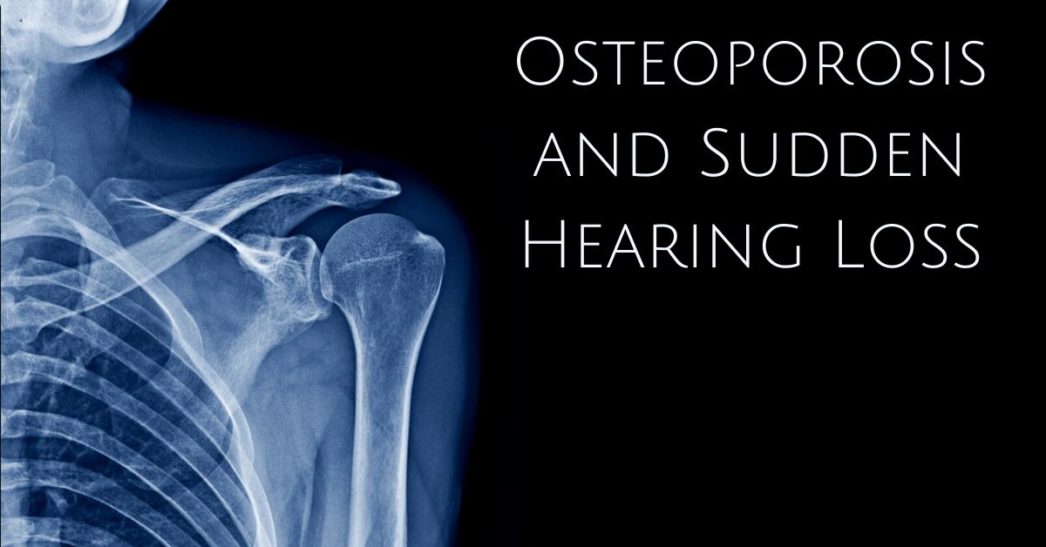Osteoporosis is a medical condition that causes bones to weaken, increasing the likelihood of breakage. According to the International Osteoporosis Foundation, nearly 44 million people in the United States have osteoporosis or low bone mass. It is commonly known that osteoporosis becomes a health risk as older adults age but did you know that it is also linked to hearing loss? Research indicates that there is a significant relationship between osteoporosis and sudden hearing loss. To understand the link between these health concerns, it is important to know about osteoporosis and the process of hearing.
What is osteoporosis?
Our bones consist of tissue that is constantly renewing. During the earlier stages of life, the process of bone renewal happens quickly and as one ages, this process slows down. Loosing bone density is a common reality of aging but loosing bone mass faster than it is created is what leads to osteoporosis which causes bones to become brittle and fragile. This allows fractures to occur more easily. The most common osteoporosis caused injuries are the wrist, spine, and hip.
A person cannot necessarily feel their bones weakening and often does not know they have osteoporosis until a bone is broken. Older adults may have more difficulty recovering from broken bones and the impact can be long lasting. According to the Centers for Disease Control and Prevention, osteoporosis affects more women than men. Specifically, 1 in 4 women and 1 in 20 men aged 65 and over experience osteoporosis.
What is involved in the hearing process?
Hearing is a complex process that requires the complete function of the ears. Our ears are sensitive organs that work to absorb and process sound. This happens by:
- Outer ear: this is the most visible part of the ear. The outer ear absorbs sound from the environment which then travels through the ear canal and strikes the ear drum causing it to vibrate.
- Middle ear: the vibrations reach the auditory ossicles which are three connected ones (among the smallest in the human body). The ossicles help amplify the sound and move the soundwaves further into the ear.
- Inner ear: the soundwaves reach the cochlea, causing the fluid and hair cells to vibrate. The soundwaves are then translated to electrical impulses that are sent to the brain to process and interpret.
Damage to any of these parts of the ear can result in hearing impairment. Injury to the ear canal, drum, ossicles, cochlea etc. can disrupt this complex process and prevent sound from being fully absorbed, amplified, and processed.
Research Findings
Studies have linked osteoporosis and gradual hearing loss. Research has shown a connection between osteoporosis and the deterioration of the auditory ossicles – the three small connected bones of the middle ear. As mentioned previously, these bones help amplify sound so any damage to these bones would result in impaired hearing. This research has shown that people with osteoporosis are more likely to experience conductive hearing loss.
In a 2015 study, researchers were interested in exploring the relationship between sudden hearing loss and osteoporosis. Published in the Journal of Clinical Endocrinology and Metabolism, this study led by Dr. Kai-Jen Tien at the Chi Mei Medical Center in Taiwan involved analyzing information collected from a national health database. Researches compared 10,660 people diagnosed with osteoporosis between 1998 and 2008 to 31,980 people (selected at random) without osteoporosis. Following the participants until 2011, the research revealed that:
- People with osteoporosis were 76% more likely to develop sudden hearing loss
- Women, specifically, with osteoporosis were 87% more likely to develop sudden hearing loss
Though this study does not show cause and effect, these significant numbers indicate a strong correlation between osteoporosis and sudden hearing loss. Dr. Kai-Jen Tien remarked, “A growing body of evidence indicates that osteoporosis affects not only bone health, but the cardiovascular and cerebrovascular systems… Our findings suggest sudden sensorineural hearing loss can be another broader health problem connected to osteoporosis.”
This indicates that people with osteoporosis should be aware of their hearing health and any changes to their ability to hear. It is also critical to have your hearing tested which will determine any further steps you need to take.


